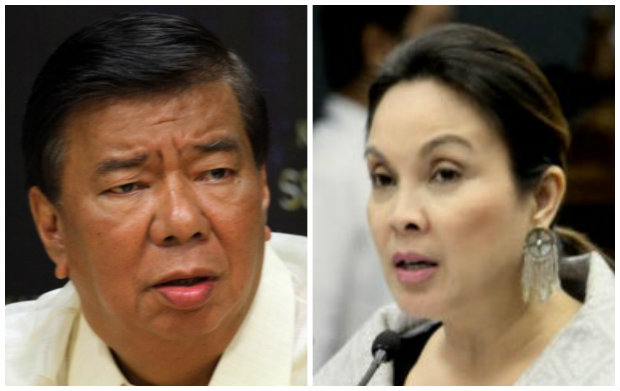
Senate President Franklin Drilon and Sen. Loren Legarda. INQUIRER FILE PHOTO / JOAN BONDOC and PHOTO from Office of Sen. Loren Legarda
A bill that mandates a four-year compensation increase for the 1.53 million civilian and military and uniformed personnel in national government starting January next year has been filed at the Senate.
READ: House panel to pass bill increasing gov’t pay on Wednesday
Senate Bill 3009 also known as “The Salary Standardization Law (SSL) of 2015” was filed Tuesday by Senate President Franklin Drilon and Senator Loren Legarda, chair of the Senate committee on finance.
According to the explanatory note of the bill, the compensation package would be composed of salary increase, mid-year 14th month pay and enhanced performance-based bonus (PBB) system.
“This piece of legislation seeks to increase the base pay of covered employees on the average of 27 percent while the 14th month pay will further raise by 8 percent,” said the note.
“The enhanced PBB is equivalent to one to two months’ basic salary or an average of 10 percent increase in basic pay. Government personnel who performs a greater role and [carries] a heavier responsibility in improving performance will receive a higher bonus,” it further said.
If passed into law, the first tranche of the adjustment would take effect on January 1, 2016 and the subsequent three tranches would be implemented every January 1 until the final tranche in 2019.
Under the bill, the compensation adjustment that would be released in January 2016 would be in the form of the first tranche salary increase and a mid-year bonus.
“By January 1, 2017, the compensation adjustment will consist of the second tranche salary increase, the Mid-Year Bonus and a 50 percent implementation of the enhanced performance-based bonus,” it said.
By January 1, 2018, the salary adjustment will include the third tranche of the salary increase, mid-year bonus and the enhanced PBB.
“Finally, in January 1, 2019, the full implementation of the SSL 2015 will be composed of the final tranche salary increase, the mid-year bonus, and the enhanced PBB,” the bill further said.
The Compensation and Position Classification System would be applied to all civilian government personnel in the executive, legislative, and judicial branches, Constitutional Commissions and other Constitutional offices, government-owned and controlled corporations not covered by Republic Act 10149, and local government units.
“This shall cover government personnel whether regular, contractual or casual, appointive or elective, and on full-time or part-time basis,” said the bill.
READ: Drilon: Congress to prioritize Salary Standardization Law before 2015 ends
In a statement on Wednesday, Drilon, said: “The economy is in the right course and we will take advantage of the favorable condition to raise the pay scheme in the government and align it with the compensation received by employees from the private sector.”
“It is about time that we adjust the salaries of the hardworking men and women who have helped the government to fulfill its mandates to the people,” he added.
Drilon added the low pay rate was the main reason why the government could not keep its employees, noting the high turnover of positions in the government.
He further cited a study commissioned by the Department of Budget and Management which showed that the pay scheme in government is 45 percent below market.
“This is particularly true for professionals and middle managers in government who only get around 41% and 25% of market rates, respectively. It is only the sub-professionals in government [who] receive 50% or more of market rates,” the Senate leader said.
Drilon also observed that some agencies were incapable of filling up vacant positions within a reasonable period of time, which inadvertently affects the smooth delivery of services to the people.
In 2015, he said, there were 191,988 unfilled positions in government.
“The new compensation package will entice employees to remain on the job and attract competent applicants to be involved in government works,” he said.
READ: P226-B pay hike up for gov’t workers
The proposed measure will cost the government P225.8 billion over four years. RAM